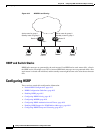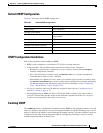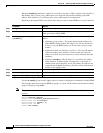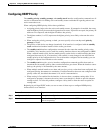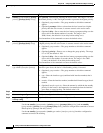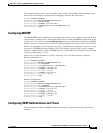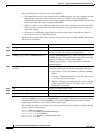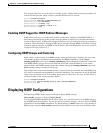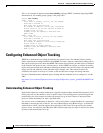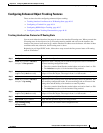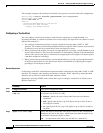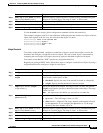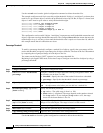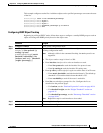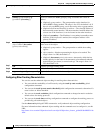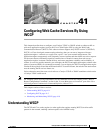
40-12
Catalyst 3750-E and 3560-E Switch Software Configuration Guide
OL-9775-02
Chapter40 Configuring HSRP and Enhanced Object Tracking
Configuring Enhanced Object Tracking
This is a an example of output from the show standby privileged EXEC command, displaying HSRP
information for two standby groups (group 1 and group 100):
Switch# show standby
VLAN1 - Group 1
Local state is Standby, priority 105, may preempt
Hellotime 3 holdtime 10
Next hello sent in 00:00:02.182
Hot standby IP address is 172.20.128.3 configured
Active router is 172.20.128.1 expires in 00:00:09
Standby router is local
Standby virtual mac address is 0000.0c07.ac01
Name is bbb
VLAN1 - Group 100
Local state is Active, priority 105, may preempt
Hellotime 3 holdtime 10
Next hello sent in 00:00:02.262
Hot standby IP address is 172.20.138.51 configured
Active router is local
Standby router is unknown expired
Standby virtual mac address is 0000.0c07.ac64
Name is test
Configuring Enhanced Object Tracking
HSRP has a mechanism for tracking the interface line-protocol state. The enhanced object tracking
feature separates the tracking mechanism from HSRP. It creates a separate, standalone tracking process
that can be used by processes other than HSRP. This feature allows tracking of other objects in addition
to the interface line-protocol state. A client process, such as HSRP, can register an interest in tracking
objects and request notification when the tracked object changes state. Several clients can track the same
object, and can take different actions when the object changes state. This feature increases the
availability and speed of recovery of a router system and decreases outages and outage duration.
For more information about enhanced object tracking and the commands used to configure it, see this
URL:
http://www.cisco.com/en/US/products/sw/iosswrel/ps1839/products_feature_guide09186a00801541be
.html
Understanding Enhanced Object Tracking
Each tracked object has a unique number that is specified on the tracking command-line interface (CLI).
Client processes use this number to track a specific object. The tracking process periodically polls the
tracked object for value changes and sends any changes (as up or down values) to interested client
processes, either immediately or after a specified delay.
You can also track a combination of objects in a list by using either a weight threshold or a percentage
threshold to measure the state of the list. You can combine objects using Boolean logic. A tracked list
with a Boolean “AND” function requires that each object in the list be in an up state for the tracked
object to be up. A tracked list with a Boolean “OR” function needs only one object in the list to be in the
up state for the tracked object to be up.



